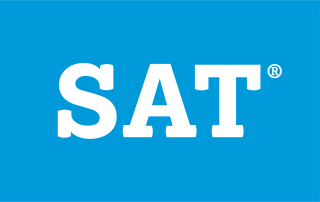Satz may refer to:
- Satz, a formal section in music analysis
- Satz (SAT solver), a well known SAT instance solver
Satz may refer to:
In logic and computer science, the Boolean satisfiability problem (sometimes called propositional satisfiability problem and abbreviated SATISFIABILITY, SAT or B-SAT) is the problem of determining if there exists an interpretation that satisfies a given Boolean formula. In other words, it asks whether the variables of a given Boolean formula can be consistently replaced by the values TRUE or FALSE in such a way that the formula evaluates to TRUE. If this is the case, the formula is called satisfiable. On the other hand, if no such assignment exists, the function expressed by the formula is FALSE for all possible variable assignments and the formula is unsatisfiable. For example, the formula "a AND NOT b" is satisfiable because one can find the values a = TRUE and b = FALSE, which make (a AND NOT b) = TRUE. In contrast, "a AND NOT a" is unsatisfiable.
The P versus NP problem is a major unsolved problem in theoretical computer science. In informal terms, it asks whether every problem whose solution can be quickly verified can also be quickly solved.
The SAT is a standardized college admissions test in the United States.

The SAT is a standardized test widely used for college admissions in the United States. Since its debut in 1926, its name and scoring have changed several times. For much of its history, it was called the Scholastic Aptitude Test and had two components, Verbal and Mathematical, each of which was scored on a range from 200 to 800. Later it was called the Scholastic Assessment Test, then the SAT I: Reasoning Test, then the SAT Reasoning Test, then simply the SAT.
A grasp generally refers to an act of taking, holding or seizing firmly with the hand.
A computer-assisted proof is a mathematical proof that has been at least partially generated by computer.
Solution may refer to:
In computational complexity theory, the maximum satisfiability problem (MAX-SAT) is the problem of determining the maximum number of clauses, of a given Boolean formula in conjunctive normal form, that can be made true by an assignment of truth values to the variables of the formula. It is a generalization of the Boolean satisfiability problem, which asks whether there exists a truth assignment that makes all clauses true.
In computer science and mathematical logic, satisfiability modulo theories (SMT) is the problem of determining whether a mathematical formula is satisfiable. It generalizes the Boolean satisfiability problem (SAT) to more complex formulas involving real numbers, integers, and/or various data structures such as lists, arrays, bit vectors, and strings. The name is derived from the fact that these expressions are interpreted within ("modulo") a certain formal theory in first-order logic with equality. SMT solvers are tools that aim to solve the SMT problem for a practical subset of inputs. SMT solvers such as Z3 and cvc5 have been used as a building block for a wide range of applications across computer science, including in automated theorem proving, program analysis, program verification, and software testing.
Viasat may refer to:
Alexander Igorevich Satz was a Russian pianist and educator.
In computer science and formal methods, a SAT solver is a computer program which aims to solve the Boolean satisfiability problem. On input a formula over Boolean variables, such as "(x or y) and (x or not y)", a SAT solver outputs whether the formula is satisfiable, meaning that there are possible values of x and y which make the formula true, or unsatisfiable, meaning that there are no such values of x and y. In this case, the formula is satisfiable when x is true, so the solver should return "satisfiable". Since the introduction of algorithms for SAT in the 1960s, modern SAT solvers have grown into complex software artifacts involving a large number of heuristics and program optimizations to work efficiently.
ZYpp is a package manager engine that powers Linux applications like YaST, Zypper and the implementation of PackageKit for openSUSE and SUSE Linux Enterprise. Unlike some more basic package managers, it provides a satisfiability solver to compute package dependencies. It is a free and open-source software project sponsored by SUSE and licensed under the terms of the GNU General Public License v2 or later. ZYpp is implemented mostly in the programming language C++.
Wayne Thomas may refer to:
David M. Satz Jr. was an American attorney who served as U.S. Attorney for the District of New Jersey from 1961 to 1969.
David Satz may refer to:

Debra Satz is an American philosopher and the Vernon R. & Lysbeth Warren Anderson Dean of the School of Humanities and Sciences at Stanford University. She is the Marta Sutton Weeks Professor of Ethics in Society, Professor of Philosophy and, by courtesy, Political Science. She teaches courses in ethics, social and political philosophy, and philosophy of social science.
Paul Satz was an American psychologist, and one of the founders of the discipline neuropsychology. His research on the relationship between the brain and human behavior spanned diverse topics including laterality, handedness, and developmental disorders. He published over 300 publications, received numerous grants and awards, and established the first neuropsychology lab. Towards the latter part of his career, Satz's research interests focused more on the cognitive deficits associated with head injury, dementia, and ageing.

Google OR-Tools is a free and open-source software suite developed by Google for solving linear programming (LP), mixed integer programming (MIP), constraint programming (CP), vehicle routing (VRP), and related optimization problems.
Z3, also known as the Z3 Theorem Prover, is a satisfiability modulo theories (SMT) solver developed by Microsoft.